Dorina Kiszelovics battles anorexia nervosa: “The disease was me, and now I have to find new definitions of who I am”
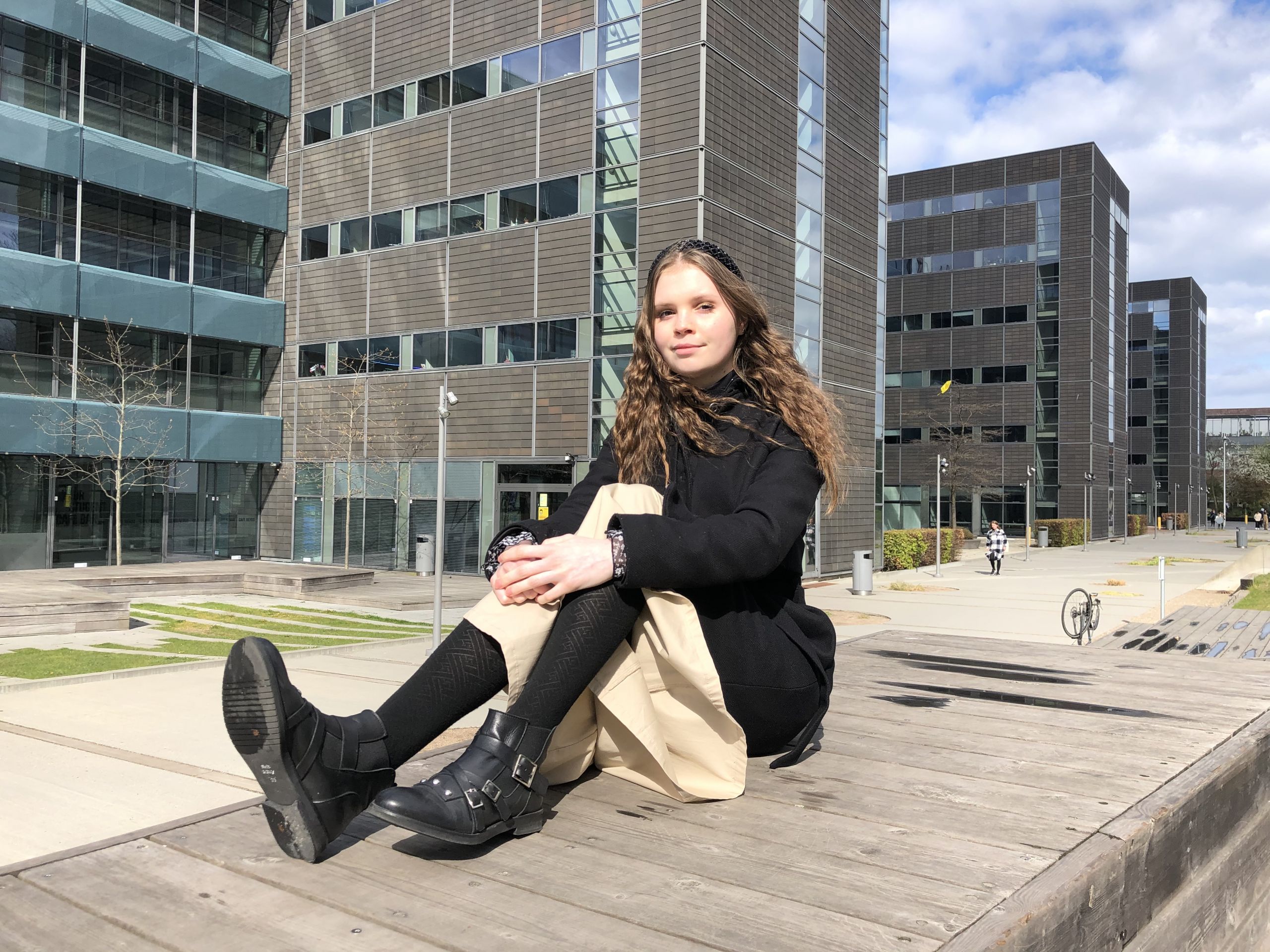
"The illness doesn’t just appear overnight. It develops slowly and becomes a part of you and your identity," explains CBS student Dorina Kiszelovics. (Photo by Mette Koors)
Last year, CBS student Dorina Kiszelovics was in a bad way. She could not get out of bed, wash her hair and, most importantly, she could not eat. Today, she is back on her feet, but continuing to struggle against her eating disorder. Her family, boyfriend, co-students and teachers at CBS have empowered her, and during the last three months, she has become aware of her own bravery. She is determined to get well.
“At the moment, I’m doing much better than I did when I was at my lowest. But it’s really hard. Here, at my ward of the hospital, they have a saying that ‘treatment requires more than a fulltime job’. And in my case, that’s definitely true!”
That’s what CBS student Dorina Kiszelovics says over the phone from her hospital bed about her current condition and wellbeing.
For three months, she’s been staying here at Psychiatric Center Ballerup and receiving treatment round the clock for her destructive and tiring eating disorder diagnosis, anorexia nervosa.
But she is now reaching the end of the beginning – meaning that she is in the last phase of the first treatment program of many more on the road to recovery.
And this is when she reaches out to CBS WIRE – to share her story and let others suffering with something similar know that they are not alone, that it is never too late to reach out for help, and that there will always be someone willing to support them – even if they think otherwise.
“The disease was me”
“Most of the time, I’m very exhausted. I’m trying to keep up with my studies, receive treatment and recover at the same time. And on top of that, as I’m approaching my target weight, everything is getting much harder because gaining weight puts me in the same mental situation that made it all go downhill for me,” Dorina Kiszelovics says.
Today, she’s a 20-year-old international student from Hungary who is in the second year of her Bachelor of Science in Business, Asian Language and Culture (IBA).
But about three years ago, she was a teenager slowly moving towards a downward spiral and becoming obsessed with working out, counting calories and being perfect.
“As far back as I can trace, it all started when I was 17 years old. Back then, the only thing that defined me was my weight and my shape. I worked out all the time, I kept tight track of all the calories I ate and generally focused on the importance of being in control of things in order to be flawless,” she says.
However, Dorina Kiszelovics explains, it can be very difficult to identify the point in time that provoked the disease.
“Numerous reasons can cause people to develop anorexia nervosa – the personal or familiar background and even genetics, to name just a few,” she says and adds:
“And at the same time, the illness doesn’t just appear overnight. It develops slowly and becomes a part of you and your identity, which makes it hard to point out why and when it all began,” she says.
Having this disease is almost like having an angel on one shoulder and a demon on the other who are constantly fighting
And according to Dorina Kiszelovics, the sneaky way that anorexia nervosa clings on to its victims is the very reason why she had the illness for several years without even noticing.
“It permeates you to the extent that you can’t really differentiate between your own true self and the anorexia. Therefore, when you’re trying to recover, you also have to figure out who you actually are without the illness. Because, at least for me, the disease was me, and now I have to find new definitions of who I am,” she says.
But finding out who you are and recovering can be quite a challenge when overshadowed by the dark sides of this cruel illness.
“Having this disease is almost like having an angel on one shoulder and a demon on the other who are constantly fighting. And it’s very difficult to manage,” Dorina Kiszelovics says and goes on:
“However, once you’re aware of such mechanisms, you become able to detect the disordered habits and behavioral patterns you’ve been having. And then, you can fight the enticing words and advice of the demon.”
Arriving on the ward
Even though she is now recovering, the devil held Dorina Kiszelovics in a tight grip right up until three months ago, when she arrived at Building 38, which houses the psychiatric ward for eating disorders.
“Before I came here and began receiving treatment, my energy level was zero. I was literally lying on my bed for days without being able to do basic stuff like showering and washing my hair. I was afraid of just passing out at some point,” she says and continues:
“But luckily, my boyfriend took a lot of responsibility and came to my rescue by acting as my private nurse and helping me to do such things and get me out of bed and through the day.”
However, besides the help from her boyfriend Frederik Simonsen, Dorina Kiszelovics also needed some professional help. And so she was hospitalized in Ballerup – an experience that was emotionally difficult.
When I found out that I was going to be hospitalized for several months I got really nervous
“Obviously, because of my illness, the first few weeks here were horrible. But on top of that, I cried every day because I missed my family in Hungary, and I felt very lonely,” she says, adding:
“But as I settled in, I began finding people here to talk to. And I can definitely say that since we’re struggling with the same type of diseases, the other patients and I have a really strong and supportive community here that motivates me a lot!”
And speaking of motivation, according to Dorina Kiszelovics, one of the main sources of encouragement throughout her battle since she was hospitalized has been CBS.
Hospitalization and studies
At around the time she was diagnosed, Dorina Kiszelovics had what she calls her “research period” – a period where she scrutinized the internet and literature for information on anorexia nervosa.
“I was scared, confused and curious all at once. I was eager to find out what my illness meant. And as I got more and more into it, I became really frightened, because from other victims of the disease I read about, I was inspired about many other ways I could harm myself even more than I had already done,” she says and continues:
“But on the other hand, it was a comforting and positive period because the more I learned about my illness, the more I learned about myself and what I’m facing. And over the past couple of months, that has been very beneficial for my recovery process alongside all the support I’ve received.”
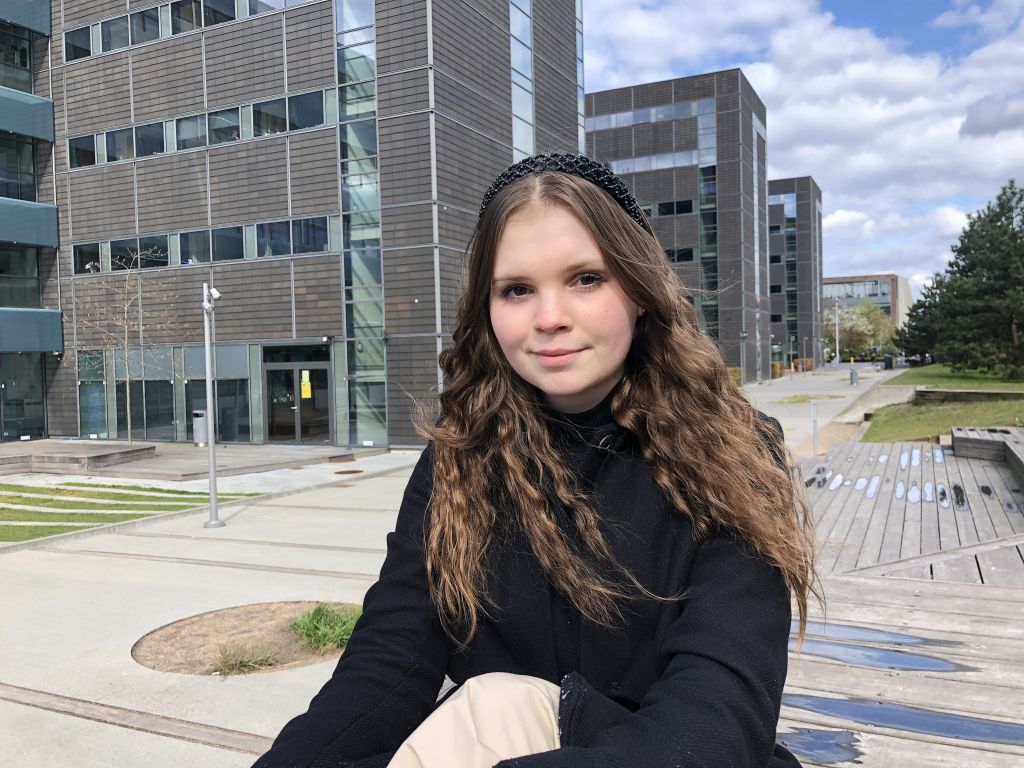
When Dorina Kiszelovics told her classmates about her disease they sent her flower and a card to support her. “And even though the flowers have withered, I still keep the card on my nightstand by my hospital bed.,” she tells with a smile on her face. (Photo by Mette Koors)
And one of the places giving her a lot of support is CBS.
“When I found out that I was going to be hospitalized for several months I got really nervous. I’m hit by one of the widespread traits of suffering with anorexia, which is being a determined perfectionist, and therefore I had many issues with putting my studies on pause. For me, that would be a sign of complete failure,” Dorina Kiszelovics and goes on:
“But then I reached out to a really kind and helpful study guide at CBS who offered me an alternative study plan. She told me that if it all became too much at some point, I should just call her and then we would figure something out together.
Right there, the feeling of being a part of a community was very strong
“That really made it much easier for me to compromise on my perfectionism and devote myself more to getting better than finishing my studies on time,” she says.
Dorina Kiszelovics explains that besides having to solve how to create synergy between her hospitalization and studies, she also had to explain her situation to all her lecturers.
“When I told them that I might not be able to attend all classes, thankfully, they were all very understanding. That really meant a lot to me,” she says.
A huge bouquet of flowers
When the study plan was settled and the CBS lecturers were informed, Dorina Kiszelovics was admitted to hospital. And even though she had already explained her situation to several people, some others were still left in the dark back on campus.
“I didn’t tell my classmates at CBS about the whole thing until I was hospitalized. It was too much of a handful. However, I knew that it wouldn’t be long before people would start wondering why I wasn’t showing up at lectures and stuff,” she says and continues:
“And so, finally, my classmates and I had a group chat on Facebook where I wrote a long message about my illness and hospitalization. And they all reacted in such a positive way that I became incredibly emotional. It really felt like they cared for me and what I was going through. Right there, the feeling of being a part of a community was very strong.”
However, the positive response was not all Dorina Kiszelovics received from her co-students.
“Apparently, as I’ve later been told, the class representatives collected money from the whole class to send me a huge bouquet of flowers to express their support for me,” she says.
I lied to all my loved ones, I cheated whenever I could with my eating, and I was constantly moody and depressed
“So, one day, when I left the ward to get some fresh air, a delivery man came and said he had flowers for me. I was completely flabbergasted and thought it had to be a mistake. But it wasn’t. Along with the bouquet was a card where they wrote that they are waiting for me to come back, that they are cheering for me and hope that I will get better.
“And even though the flowers have withered, I still keep the card on my nightstand by my hospital bed. It makes me feel brave because I shared my story with them. At the same time, it really motivates me to get well.”
However, despite the beautiful flowers and words on a card, home is where the heart is. And throughout her journey, Dorina Kiszelovics has felt that in its essence.
Tearful reunion
During the autumn break last year, at the worst point in her illness, she visited her parents back home in Hungary. But when the holidays were over, and Dorina Kiszelovics was about to go back to Denmark, they were very reluctant.
“When I got the news that I was going to be hospitalized in Denmark, it was hard for them. I’m their only child, and it was difficult for them to let me go to be treated in another country bearing in mind the state I was in,” she says and goes on:
“Especially because my parents speak neither English nor Danish, and therefore wouldn’t be able to ask any of the personnel about the details of my treatment and my condition. On top of that, we have no such institutions in Hungary like the ones here in Denmark where parents get help with tackling their children’s eating disorder. So that didn’t make it any easier for them.”
But eventually, Dorina Kiszelovics’ parents let her go to Denmark to receive treatment for her anorexia nervosa, and over the course of the process, her parents have become more comfortable with the situation.
“While I have been receiving help here, my parents have been seeing a family therapist in Hungary who specializes in eating disorders. And slowly, they’ve begun to understand more about my illness, and how to support me when we’re together,” she says.
Though, after months of separation due to COVID-19, they finally gathered again recently.
“I hadn’t seen my parents for seven straight months. But finally, two weeks ago, they could finally travel from Hungary to visit me. They did everything in their power to be able to come despite the circumstances, and once they saw me, it became a tearful reunion,” says Dorina Kiszelovics.
“And when they left, I was enormously determined to fight my illness and get back on track.”
Pros and cons of anorexia nervosa
Back in her hospital bed in Ballerup with CBS WIRE on the phone, Dorina Kiszelovics can look back on three months of intense treatment and destructive temptations – but also a long string of encouraging experiences that have fueled her desire to beat her terrible disease.
However, as she says herself, the fight is far from over yet. Even though she has to find new definitions of herself without anorexia nervosa, it will somehow always be a part of her.
And actually, she’s very thankful for that.
“Just before the interview, I had a talk with my psychologist and as an exercise, we assessed the pros and cons of my illness,” she says and continues:
“Basically, I reached the conclusion that anorexia has brought the worst version of me to the surface: I lied to all my loved ones, I cheated whenever I could with my eating, and I was constantly moody and depressed.”
“But it also made me realize how I don’t want to be like that as a person. And for that, I’m thankful!”
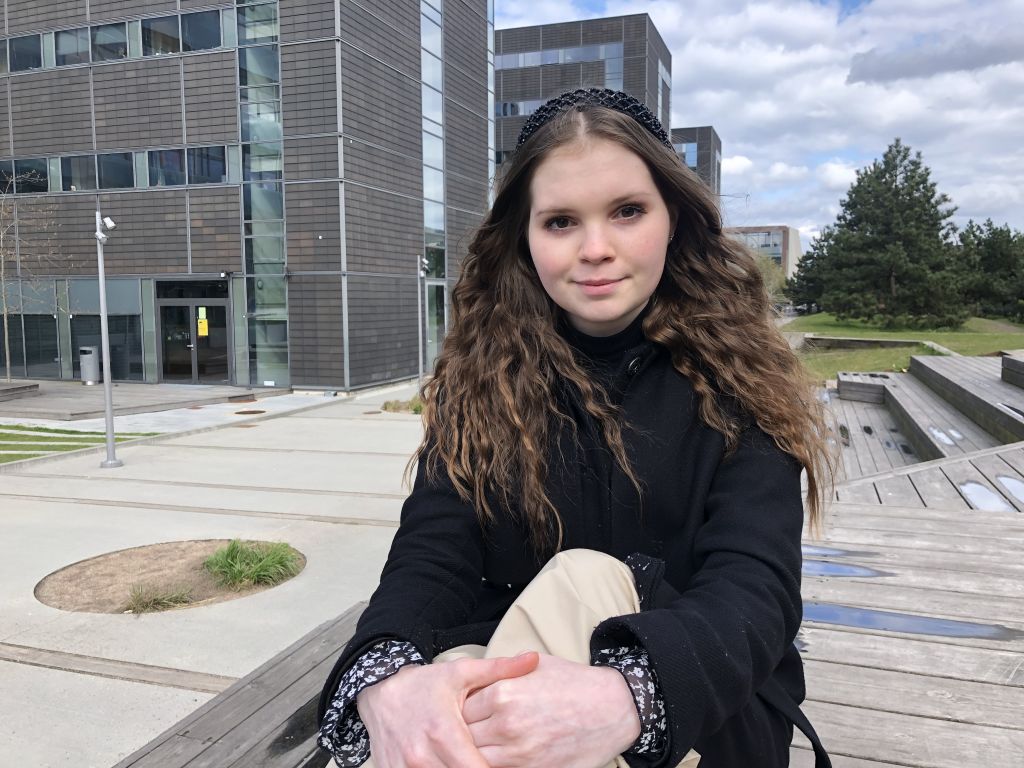
“Reach out to someone in your surroundings – let it be relatives, friends, co-students or teachers. That is where it all starts. And you will be surprised how willing people are to help you,” says Dorina Kiszelovics. Photo by Mette Koors)





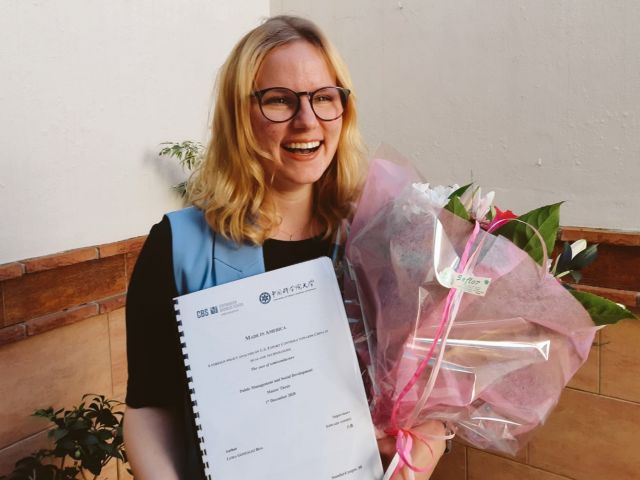
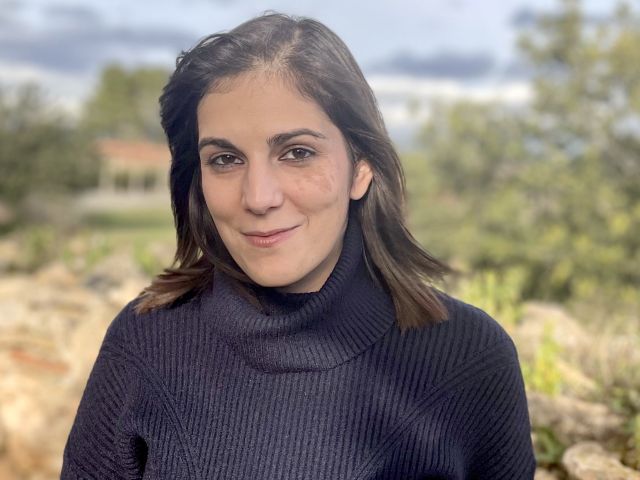

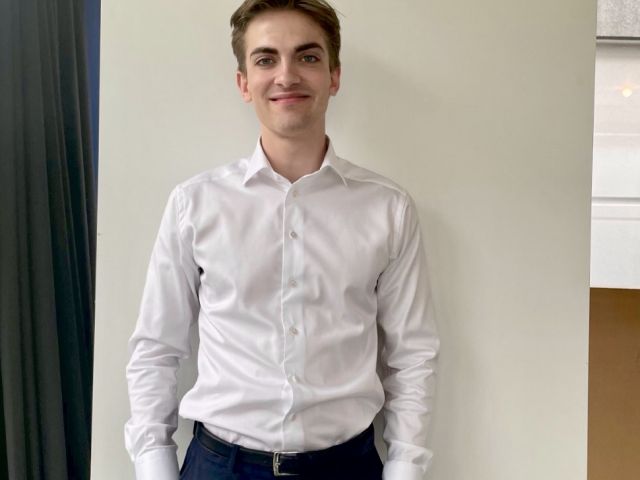




























































































































Comments